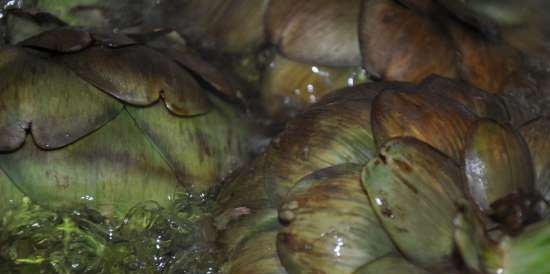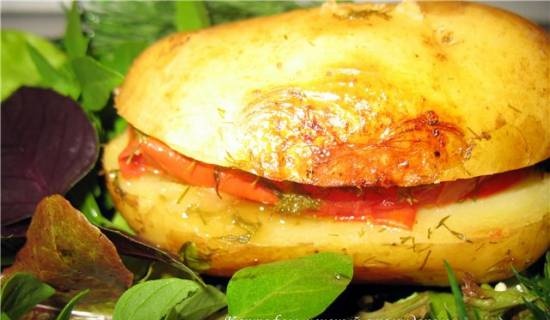|
 In scientifically grounded rational nutrition, an important place belongs to potatoes, vegetables and fruits, which supply the body with vitamins, minerals and trace elements. In scientifically grounded rational nutrition, an important place belongs to potatoes, vegetables and fruits, which supply the body with vitamins, minerals and trace elements.
In recent years, the consumption of vegetables and fruits in general has been showing an upward trend, while the consumption of potatoes, on the contrary, has been showing a downward trend. This can be considered normal. The structure of consumption of vegetables and fruits largely depends on climatic conditions: in our country there are especially favorable conditions for growing potatoes, while the range of vegetables and fruits in our country is small and much more difficult to grow them. The import of fruits and melons (watermelons, melons, zucchini, squash) from the southern countries normalizes their consumption in our country. It should be noted that according to scientifically grounded norms, it is recommended to consume about 100 kg of potatoes, 164 kg of vegetables and melons and 133 kg of fruits per year.
We consume comparatively a lot of white cabbage (21.5% of the total amount of vegetables), tomatoes (18.3%), carrots (16.7%), cucumbers (7.5%), onions (6.2%), followed by beets, cauliflower and other types of cabbage, lettuce, pumpkin, rutabaga, etc.
Depending on which part of the plant is used for food, the following groups of vegetable crops are distinguished:
1) leafy: white cabbage, red cabbage and savoy cabbage, Brussels sprouts, Chinese cabbage, lettuce, spinach, sorrel, rhubarb, dill, watercress. Leaves of other plants are also used, such as celery and parsley;
2) fruit: cucumbers, pumpkin, watermelons, zucchini, squash, tomatoes, capsicum (paprika), eggplant;
3) legumes: peas, beans, beans;
4) cuttings: kohlrabi, asparagus (young shoots);
5) root vegetables: carrots, rutabagas, turnips, beets, radishes, black and white radishes, horseradish, celery, parsley, parsnips, goat (the latter are grown very rarely);
6) onions: onions, leeks, garlic, tartar, chives;
7) flowering: cauliflower, artichoke... The artichoke eats the lower part of the inflorescence as long as it is fresh and juicy. We do not grow artichokes and generally belong to rare vegetables.
Fruits are divided into the following groups:
1) pome fruits: apples, pears, quince;
2) stone fruits: cherries, sweet cherries, plums, thorns, apricots, peaches;
3) citrus fruits: lemons, oranges, tangerines, grapefruits;
4) tropical: bananas, dates, figs, pomegranates, pineapples.
Berries include: grapes, strawberries, raspberries, white, red and black currants, gooseberries, cloudberries, blackberries, cranberries, blueberries, lingonberries, blueberries, rose hips, mountain ash, barberry.
A separate group is made up of nuts and almonds: hazelnuts, walnuts, peanuts, pistachios, almonds, etc.
For the preparation of salads, you can use almost all vegetables and fruits, preferably more juicy, tasty. Rarely prepare a salad of beans, savoy cabbage, sorrel; fruits (other than apples) are not often added, although they significantly improve the flavor of the salad, make it more juicy and add nutritional value. In winter, fresh fruits and berries can be replaced with compote, pickled fruits and other canned foods.
Depending on the form in which vegetables are used in the salad, they are divided into the following groups:
- fresh raw vegetables: lettuce, chives, green onions, onions, radishes, black and white radish, horseradish, cucumbers, tomatoes, garlic, dill, celery and parsley leaves, watercress, all fruits and berries; pickled raw vegetables: cucumbers, tomatoes, cabbage, apples;
- vegetables used in raw and boiled form: carrots, rutabagas, turnips, beets, celery, spinach, rhubarb, cabbage, parsley root, green peas, kohlrabi, cauliflower;
- vegetables used only in boiled form: potatoes, beans, beans, peas, mushrooms, asparagus, goat. In winter, raw vegetable salads can be made with well-preserved vegetables such as beets, rutabagas, cabbage, carrots and onions. It is recommended to harvest more salted and pickled vegetables for the winter.
I. Abramson, Salme Masso "Salads and Refreshments"
|







